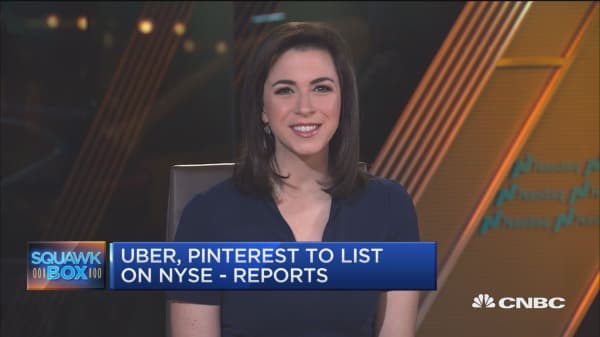Some high-profile, privately held companies — including Uber, Lyft, Pinterest and Airbnb — are about to break into the public market by launching an initial public offering.
So, what exactly is an IPO?
An IPO is the process by which a private company issues its first shares of stock for public sale. This is also known as "going public." Beyond structuring a firm's shares for sale, the process includes establishing stakeholders and creating regulatory compliance aimed at financial disclosures and transparency. This process exists, experts say, to protect the investor public from purchasing shares in fraudulent companies.
Here's what else you should know about the IPO process.
Why a company files an IPO Martin Barraud | Getty Images
Martin Barraud | Getty Images It's amid discussions of funding options that the topic of going public will typically crop up at a company, said Tim Jenkinson, a finance professor at the Saïd Business School at the University of Oxford.
IPOs can be an opportunity for businesses to rake in huge amounts of money, which they can use to ramp up hiring or acquire other firms.
Some private companies can be under pressure from their original investors to go public, Jenkinson said. That's because the venture capital or private equity firms that have funneled money into a company want to realize a profit, and one way for them to do so is if the company is able to be bought and sold on the public market.
show chapters Investors try to determine whether Lyft's IPO valuation is expensive or cheap 8:57 AM ET Fri, 22 March 2019 | 02:05
Investors try to determine whether Lyft's IPO valuation is expensive or cheap 8:57 AM ET Fri, 22 March 2019 | 02:05 While original investors could also see a return if the private company is purchased by another company, Jenkinson said, that option isn't always available.
That might be because a company has found itself "too big" to be bought by another company, he said. Lyft is pegging its valuation between $21 billion and $23 billion, for example. "The more successful the company, the fewer the exits there are, except for the public market," Jenkinson said.
Employees of the private company might also be antsy to unload some of their equity. "You can't pay your rent in San Francisco with restricted stock," said Greg Rodgers, a capital markets lawyer and partner at Latham & Watkins.
There's another reason for the stampede toward the public market as of late, Jenkinson said. The stock market is approaching all-time highs, with the S&P 500 index up more than 200 percent over the last decade.
"Many people are saying, 'This is a great time to exit. Who knows what's around the corner?'" he said.
How it works Hutton Supancic | Getty Images Entertainment | Getty Images Lyft van is seen during the SXSW Music, Film + Interactive Festival at Austin Convention Center in Austin, Texas.
Hutton Supancic | Getty Images Entertainment | Getty Images Lyft van is seen during the SXSW Music, Film + Interactive Festival at Austin Convention Center in Austin, Texas. An IPO generally takes around four to six months. "It's a very grueling process for the directors of the company," Jenkinson said.
Companies first have to decide on an investment bank — often called a "book running manager" — to lead them through the process, said Roni Michaely, a professor at the Geneva Finance Research Institute at the University of Geneva in Switzerland.
The company then typically files a confidential document, dubbed the IPO prospectus, with the Securities and Exchange Commission. That filing is supposed to contain everything investors should know about the company, including its risk factors and financial statements.
.1553267739508.jpeg)
After a number of rounds with the SEC, that document is eventually publicly released.
Then the company goes on a "road show," during which prospective investors get to meet executives at the company and ask them questions. Think of the prospectus as a resume, and the road show as the job interview.
A company is essentially gauging its demand throughout this tour. A business typically aims to reach "a triple oversubscription," Michaely said. That means it wants three times the interest in its shares than it'll make available.
More demand, of course, allows the company to price itself higher.
"If your 401(k) is invested in equities, there's good chance you will benefit." -Jay R. Ritter, corporate finance professor at The Warrington College of Business at the University of FloridaOn the last night of the road show, and before the trading begins on the public market, the investment bank and the company executives huddle to determine the price of their stock and to whom they'll allocate how many shares.
Most everyday investors aren't involved in the process. Typically, 85 percent of a company's shares during an IPO are sold to institutional investors, and the rest to individuals, said Jay R. Ritter, a finance professor at The Warrington College of Business at the University of Florida.
However, Lyft's IPO this month could, in theory, make a difference in your retirement down the road nonetheless.
"If your 401(k) is invested in equities, there's good chance you will benefit," said Ritter.
How the landscape has changed George Kavallines
George Kavallines Despite the rush of IPO headlines as of late, the process has actually grown less common.
Between 2000 and 2018, an average of 110 companies went public each year, compared with more than 300 a year between 1980 and 2000. "It's a dramatically lower number, even though the economy is much bigger than it was 30 years ago," Ritter said.
That's mainly because companies increasingly have other ways than the public market to raise money. "There's been an explosion in the private capital available to companies," Rodgers said.
And some companies are going public without an IPO — but through a process called a direct listing, in which shares are offered directly to public investors without the underwriting of a Wall Street bank.
More from Advisor Insight:
Prepare your heirs for the $68 trillion 'great wealth transfer'
Why some advisors are moving to shield the elderly from fraud
Has your broker or advisor landed on FINRA's 'bad guy' list?
Rodgers, who worked on the recent direct listing of music-streaming service Spotify, said the option makes sense for companies that already have a robust shareholder base and no need for immediate capital. "It's essentially leaping into life as a public company without doing an offering," he said.
Many executives are also not eager for the scrutiny — including swarms of analysts, government regulation and constant coverage in news media — that comes with becoming a public company, Rodgers said.
"Your life going forward is lived under a microscope," he said.

 Source: Shutterstock
Source: Shutterstock  Prudential Financial Inc. decreased its position in shares of Houlihan Lokey Inc (NYSE:HLI) by 1.8% during the fourth quarter, according to the company in its most recent disclosure with the Securities & Exchange Commission. The fund owned 142,061 shares of the financial services provider’s stock after selling 2,612 shares during the quarter. Prudential Financial Inc. owned 0.22% of Houlihan Lokey worth $5,228,000 as of its most recent filing with the Securities & Exchange Commission.
Prudential Financial Inc. decreased its position in shares of Houlihan Lokey Inc (NYSE:HLI) by 1.8% during the fourth quarter, according to the company in its most recent disclosure with the Securities & Exchange Commission. The fund owned 142,061 shares of the financial services provider’s stock after selling 2,612 shares during the quarter. Prudential Financial Inc. owned 0.22% of Houlihan Lokey worth $5,228,000 as of its most recent filing with the Securities & Exchange Commission.  Citigroup Inc. boosted its position in shares of Amdocs Limited (NASDAQ:DOX) by 0.8% during the 4th quarter, HoldingsChannel.com reports. The fund owned 86,236 shares of the technology company’s stock after buying an additional 695 shares during the quarter. Citigroup Inc.’s holdings in Amdocs were worth $5,052,000 as of its most recent filing with the Securities & Exchange Commission.
Citigroup Inc. boosted its position in shares of Amdocs Limited (NASDAQ:DOX) by 0.8% during the 4th quarter, HoldingsChannel.com reports. The fund owned 86,236 shares of the technology company’s stock after buying an additional 695 shares during the quarter. Citigroup Inc.’s holdings in Amdocs were worth $5,052,000 as of its most recent filing with the Securities & Exchange Commission.  Media headlines about Exxon Mobil (NYSE:XOM) have been trending somewhat positive on Saturday, according to InfoTrie. InfoTrie ranks the sentiment of press coverage by analyzing more than 6,000 blog and news sources in real-time. The firm ranks coverage of publicly-traded companies on a scale of -5 to 5, with scores closest to five being the most favorable. Exxon Mobil earned a daily sentiment score of 0.93 on their scale. InfoTrie also gave media stories about the oil and gas company an news buzz score of 8 out of 10, indicating that recent press coverage is very likely to have an effect on the company’s share price in the immediate future.
Media headlines about Exxon Mobil (NYSE:XOM) have been trending somewhat positive on Saturday, according to InfoTrie. InfoTrie ranks the sentiment of press coverage by analyzing more than 6,000 blog and news sources in real-time. The firm ranks coverage of publicly-traded companies on a scale of -5 to 5, with scores closest to five being the most favorable. Exxon Mobil earned a daily sentiment score of 0.93 on their scale. InfoTrie also gave media stories about the oil and gas company an news buzz score of 8 out of 10, indicating that recent press coverage is very likely to have an effect on the company’s share price in the immediate future. 
 Freestone Capital Holdings LLC bought a new stake in shares of BioMarin Pharmaceutical Inc. (NASDAQ:BMRN) in the fourth quarter, according to its most recent filing with the Securities and Exchange Commission. The fund bought 3,798 shares of the biotechnology company’s stock, valued at approximately $323,000.
Freestone Capital Holdings LLC bought a new stake in shares of BioMarin Pharmaceutical Inc. (NASDAQ:BMRN) in the fourth quarter, according to its most recent filing with the Securities and Exchange Commission. The fund bought 3,798 shares of the biotechnology company’s stock, valued at approximately $323,000. 


 Etherparty (CURRENCY:FUEL) traded up 22.7% against the U.S. dollar during the one day period ending at 14:00 PM E.T. on March 4th. One Etherparty token can now be bought for approximately $0.0104 or 0.00000276 BTC on major cryptocurrency exchanges including HitBTC, Gate.io, Binance and ACX. Etherparty has a market capitalization of $5.82 million and $14.23 million worth of Etherparty was traded on exchanges in the last day. In the last seven days, Etherparty has traded up 28.5% against the U.S. dollar.
Etherparty (CURRENCY:FUEL) traded up 22.7% against the U.S. dollar during the one day period ending at 14:00 PM E.T. on March 4th. One Etherparty token can now be bought for approximately $0.0104 or 0.00000276 BTC on major cryptocurrency exchanges including HitBTC, Gate.io, Binance and ACX. Etherparty has a market capitalization of $5.82 million and $14.23 million worth of Etherparty was traded on exchanges in the last day. In the last seven days, Etherparty has traded up 28.5% against the U.S. dollar.  BP Capital Fund Advisors LLC decreased its holdings in Andeavor Logistics LP (NYSE:ANDX) by 26.9% during the 4th quarter, HoldingsChannel reports. The fund owned 44,803 shares of the oil and gas company’s stock after selling 16,489 shares during the quarter. BP Capital Fund Advisors LLC’s holdings in Andeavor Logistics were worth $1,456,000 as of its most recent SEC filing.
BP Capital Fund Advisors LLC decreased its holdings in Andeavor Logistics LP (NYSE:ANDX) by 26.9% during the 4th quarter, HoldingsChannel reports. The fund owned 44,803 shares of the oil and gas company’s stock after selling 16,489 shares during the quarter. BP Capital Fund Advisors LLC’s holdings in Andeavor Logistics were worth $1,456,000 as of its most recent SEC filing.  Wall Street brokerages expect Lakeland Financial Co. (NASDAQ:LKFN) to announce $0.82 earnings per share (EPS) for the current quarter, Zacks Investment Research reports. Four analysts have made estimates for Lakeland Financial’s earnings, with the lowest EPS estimate coming in at $0.79 and the highest estimate coming in at $0.84. Lakeland Financial reported earnings per share of $0.71 during the same quarter last year, which suggests a positive year over year growth rate of 15.5%. The company is scheduled to report its next quarterly earnings results on Wednesday, April 24th.
Wall Street brokerages expect Lakeland Financial Co. (NASDAQ:LKFN) to announce $0.82 earnings per share (EPS) for the current quarter, Zacks Investment Research reports. Four analysts have made estimates for Lakeland Financial’s earnings, with the lowest EPS estimate coming in at $0.79 and the highest estimate coming in at $0.84. Lakeland Financial reported earnings per share of $0.71 during the same quarter last year, which suggests a positive year over year growth rate of 15.5%. The company is scheduled to report its next quarterly earnings results on Wednesday, April 24th. Diamond Hill Capital Management Inc. lessened its stake in Live Nation Entertainment, Inc. (NYSE:LYV) by 6.6% in the fourth quarter, according to its most recent filing with the Securities & Exchange Commission. The institutional investor owned 995,652 shares of the company’s stock after selling 70,370 shares during the period. Diamond Hill Capital Management Inc. owned 0.48% of Live Nation Entertainment worth $49,036,000 at the end of the most recent quarter.
Diamond Hill Capital Management Inc. lessened its stake in Live Nation Entertainment, Inc. (NYSE:LYV) by 6.6% in the fourth quarter, according to its most recent filing with the Securities & Exchange Commission. The institutional investor owned 995,652 shares of the company’s stock after selling 70,370 shares during the period. Diamond Hill Capital Management Inc. owned 0.48% of Live Nation Entertainment worth $49,036,000 at the end of the most recent quarter.